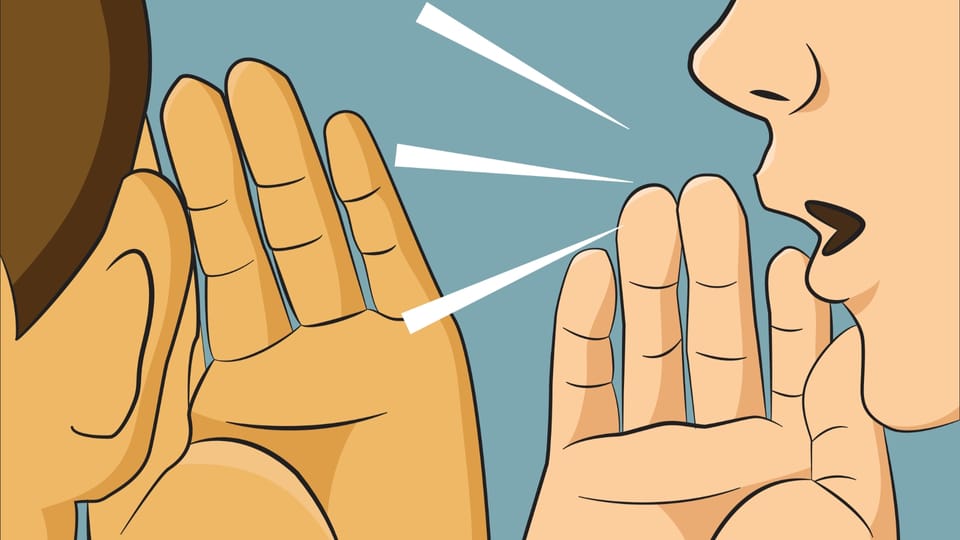A Prayer When Slandered (Psalm 7)

Big Idea: When slandered, lay yourself before God, ask him to act, remind yourself who he is, and then praise him.
I would like this sermon this morning to be a practical one. I want to address a problem that all of us are going to face eventually. You may be facing it right now. The problem is slander.
Three preachers were on a fishing trip when they began to discuss various topics to pass the time. One preacher said he thought it would be nice if they confessed their biggest sins to each other and then prayed for each other. They all agreed, and the first preacher said that his biggest sin was that he liked to sit at the beach now and then and watch pretty women stroll by. The second preacher confessed that his biggest sin was that he went to the horse racing track every so often and put a small bet on a horse. Turning to the third preacher, they asked, “Brother, what is your biggest sin?” With a grin, he said, “My biggest sin is gossiping.”
That’s not what I’m talking about. Gossip is a serious problem, but it’s different from slander. Sometimes people will say negative things about us. When they do, we have to admit that they’re right. In fact, sometimes they don’t know the half of it. Dealing with accurate criticism or the problem of people who repeat unsavory details of your life is a problem, but it’s not the problem I want to talk about this morning.
No, the problem I want to talk about is the problem of slander. Slander is when someone makes an untrue and unjust accusation against you. It’s a false and malicious statement that damages your reputation. The problem with slander is that you can’t address the issue they’ve raised against you. If someone says that I stole their car and I did, I can return the keys and apologize. But if someone says that I stole their car and I didn’t, then I can’t return the keys. You can’t repent for what you haven’t done. But the damage of the accusation can stick and do all kinds of damage.
Quite a while ago, two people I know well were victims of slander. Serious accusations were raised against them. These accusations were so serious that they tainted their names. Their protestations of innocence only made them look like they were unwilling to take responsibility. The accusations were investigated and found to be untrue, but not before they did tremendous damage. That is the nature of slander. It’s deadly, and it’s very difficult to know how to respond when it happens.
The psalm we’re looking at this morning deals with this very topic. We read at the top of the psalm, “A shiggaion of David, which he sang to the Lord concerning the words of Cush, a Benjamite.” We don’t know the particular situation it’s talking about, but we discover pretty quickly that David had been slandered. David even describes how damaging this is. He says in verses 1-2:
O LORD my God, in you do I take refuge;
save me from all my pursuers and deliver me,
lest like a lion they tear my soul apart,
rending it in pieces, with none to deliver.
Slander is not some benign non-issue that you should just shrug off. David says here that it’s serious. Look at the image he gives us. He doesn’t say that the slanderers are like annoying flies buzzing around his ears. No, he compares them to lions that could tear his soul apart. David is a hunted man here. He is in serious trouble.
So what should we do when we’re slandered? Buckle your seatbelts, because David shows us how to do four things.
First, lay yourself before God.
Read verses 1-5:
O LORD my God, in you do I take refuge;
save me from all my pursuers and deliver me,
lest like a lion they tear my soul apart,
rending it in pieces, with none to deliver.
O LORD my God, if I have done this,
if there is wrong in my hands,
if I have repaid my friend with evil
or plundered my enemy without cause,
let the enemy pursue my soul and overtake it,
and let him trample my life to the ground
and lay my glory in the dust. Selah
David begins by laying himself out before God. He begins with full disclosure. There’s something to be said sometimes for playing your cards close to your chest. You don’t want to disclose everything to everyone. But when David is the victim of slander, he goes running to God, and he doesn’t hold anything back. He lays down his cards before God.
Look at how David begins: he says that he’s found refuge or shelter in God. Men go to ridiculous lengths to assert their independence. The ideal man, according to some, never goes to the doctor, never takes medicine, never asks directions, and never has an emotion (only allergies). When they suffer, they suffer alone and barely admit it. They certainly don’t need a refuge. David isn’t that kind of ideal man. David shows us that the ideal man is someone who recognizes that he needs a shelter, a refuge. Don’t miss that David doesn’t say, “I’m now going to take refuge in you now that I’m in trouble.” He actually says that he’s taken refuge in God before the trouble hit. We can learn from that. Don’t wait until you’re in the middle of trouble to find your refuge in God. Admit your need for God, and take refuge in him now.
Then David lays two things before God in verses 1-2. Full disclosure. First, he lays out the danger that he’s in. We’ve already seen this. David is helpless. Even having found refuge in God, he feels that he’s in real danger. He doesn’t sugarcoat the situation. He doesn’t put the best spin on it. He simply lays out the facts and his vulnerability before God.
But then David lays out a second thing before God: he lays open his heart for examination. This is one of the hardest things to do. David lays out his conscience before God. He’s examined it as best he can and, as best as he can tell, it’s clear. But he lays it before God as well and says that if the slanders are true, and if the accusations are accurate, and if he’s done wrong, then let God take the side of his accusers, and let David suffer the consequences. “He realizes that he stands under God’s gaze and knows that God will know him truly” (Dale Ralph Davis).
I was recently on the receiving end of some pretty severe criticism. It’s always difficult when this happens, because you want to learn from the criticism. As I thought about it over a few days, I realized that there were some things I could learn. But my immediate impulse was to be defensive, to withdraw into myself. David doesn’t do that. He turns to God who is his refuge. He lays out his danger before God, and then invites God to examine his heart. He shows us that when we’re slandered we can lay ourselves out before God in complete honesty, inviting him to examine the situation including our hearts.
So David begins by showing us that when slandered we can lay ourselves out before God.
Second, ask God to act.
Read verses 6-9:
Arise, O LORD, in your anger;
lift yourself up against the fury of my enemies;
awake for me; you have appointed a judgment.
Let the assembly of the peoples be gathered about you;
over it return on high.
The LORD judges the peoples;
judge me, O LORD, according to my righteousness
and according to the integrity that is in me.
Oh, let the evil of the wicked come to an end,
and may you establish the righteous—
you who test the minds and hearts,
O righteous God!
We’re going to run into this type of prayer a few times in the psalms. Does this bother anyone? David asks God to unleash his fury upon David’s enemies. Some people say, “Well, that doesn’t sound very Christian. Why can’t David be more forgiving?” It seems unfair to ask God to rise up in anger and judge people who have wronged us.
But let’s think about this. People say, “How could a good and loving God be filled with wrath?” But at the same time we recognize that there are all kinds of good reasons to be filled with wrath. This past week you’ve read about the rioting in England. Prime Minister David Cameron came on TV and said, “Well, let’s not get angry here. Hooligans aren’t bad people.” No, he got angry. He promised to ensure that every looter was caught, brought to court, and sentenced, and that “phony human rights” concerns would not get in the way. “The whole country has been shocked by the most appalling scenes of people looting, violence, vandalizing and thieving,” Cameron said at the beginning of his statement to what appeared to be a full house of parliamentarians sitting on long rows of green benches. “It is criminality pure and simple. And there is absolutely no excuse for it.” That’s entirely appropriate. If he had stayed on vacation and hadn’t come back and done something about the crisis, then he wouldn’t have been doing his job. People expect him to act and respond to injustice.
That is exactly the same with God. When injustice is taking place, it would be a travesty to think that God was sitting by and doing nothing. It is entirely appropriate for God to take notice of wrong and to act, and that’s exactly what David is asking God to do. David is asking God to take note and to respond appropriately. Becky Pippert makes the point that the more that you love somebody, the more you care, the more you get angry when they’re the victim of injustice. She then says, “If I, a flawed, narcissistic, sinful woman, can feel this much pain and anger over someone’s condition, how much more a morally perfect God who made them? God’s wrath is not a cranky explosion, but his settled opposition to the cancer of sin which is eating out the insides of the human race he loves with his whole being.” It’s like C.S. Lewis put it: “The absence of anger, especially the sort of anger which we call indignation, can, in my opinion, be a most alarming symptom.”
In other words, we can actually find hope in God’s anger. When you’re being battered and pursued, when it looks like people are out to get you, and you can’t do anything about it, you can find hope in the fact that God sees and that God will set things straight. N.T. Wright puts it this way:
The word judgment carries negative overtones for a good many people in our liberal and post-liberal world. We need to remind ourselves that throughout the Bible God’s coming judgment is a good thing, something to be celebrated, longed for, yearned over. It causes people to shout for joy and the trees of the field to clap their hands. In a world of systematic injustice, bullying, violence, arrogance, and oppression, the thought that there might come a day when the wicked are firmly put in their place and the poor and weak are given their due is the best news there can be. Faced with a world in rebellion, a world full of exploitation and wickedness, a good God must be a God of judgment.
So it’s entirely appropriate for us to ask God to act and to set things straight. So lay yourself out before God. Don’t play your cards close to your chest. Lay the situation out before God clearly. And then ask God to act. Say, in effect, “Are you seeing this? Do something!” Ask God to act justly to set the situation right.
Third, remind yourself of who God is.
Notice the change in verse 8. Up until now David has been speaking to God. In verses 8 to 11 he switches and talks about God as well as to God. What’s happening here? Somebody’s said it’s as if he’s seen God in his mind rise up and take action. It’s as if as David is praying that he senses God has heard, and has risen up in answer to his prayer. It just could be that David shifts his focus. He begins to focus on God.
We travelled to New York back in July. New York has to be one of my most favorite cities. You have this sense as you’re walking around what’s happening on the ground. You go through different parts of the city. In some places it’s so packed you can barely move. In other places it’s quieter and more businesslike. Wherever you are, you get the sense of what the city is like in that place, knowing that it could be very different a block over.
But then one day I went to the Top of the Rock, the top of the Rockefeller Plaza. From the 70th floor things look very different. You can see the city in a way that you can’t see from the ground.
That’s what happens in this psalm. David has been at street-level dealing with slander. Then in verses 8 to 11 he gets a very different perspective as he’s elevated, as he gets a larger picture of who God is. He says:
The LORD judges the peoples;
judge me, O LORD, according to my righteousness
and according to the integrity that is in me.
Oh, let the evil of the wicked come to an end,
and may you establish the righteous—
you who test the minds and hearts,
O righteous God!
My shield is with God,
who saves the upright in heart.
God is a righteous judge,
and a God who feels indignation every day.
See David’s focus here? His focus is on a God who judges the peoples. The picture David has is that God is sovereign over all the earth, and that nothing happens without his knowledge our outside of his control. What’s more, David sees God as one who brings an end to evil, and who establishes the righteous. He is not without emotion. He is a good, David says, who feels indignation every day.
What we really need, David shows us, is a vision of God. We need to get off the street level to where we can see the bigger picture, when we can remind ourselves of who God is and how it relates to what we’re going through. A few years ago Timothy Stoner wrote a book with a funny title: The God Who Smokes: Scandalous Meditations on Faith. I was so put off by the title that I almost never read it. But title, The God Who Smokes, is actually a reference to God as a consuming fire, God as one who has a holy and passionate love and anger. He writes:
God really believes that he is the most worthy, most majestic, magnificent, glorious, stunningly beautiful being in the universe. And he is fixated on the certainty that only he deserves worship – that to him alone belong honor, glory, and praise forever and forever. With red-rimmed, stinging eyes and burning hair, all we can say is – he is right. He is astonishingly beautiful, utterly majestic and perfect in the symmetries of justice and righteousness, knowledge, and wisdom. He is as hypnotically compelling as a surging forest fire and ten times as dangerous. He is out of control – ours, not his.
That’s what we need. We need to see God for who he is: the most majestic, magnificent, glorious, stunningly beautiful being in the universe. He alone is worthy of honor, glory, and praise. He is astonishingly beautiful and utterly majestic. He is right. As we get this picture of God, things will start to look very different at street level.
This plays out as David looks back at those who are slandering him. David turns from gazing upon God to the slanderers, and he says:
If a man does not repent, God will whet his sword;
he has bent and readied his bow;
he has prepared for him his deadly weapons,
making his arrows fiery shafts.
Behold, the wicked man conceives evil
and is pregnant with mischief
and gives birth to lies.
He makes a pit, digging it out,
and falls into the hole that he has made.
His mischief returns upon his own head,
and on his own skull his violence descends.
As David’s perspective changes, he sees the slanderers differently too. Before they looked like lions that were about to devour him. Now they look very differently. They look like victims of God’s imminent justice. They actually look kind of pathetic: like someone who falls into the whole that he dug for someone else. He lays a booby-trap but sets it off himself. It may take some time, but their evil will destroy themselves.
Years ago Paul Allen – a former youth pastor here – told me something I’ll never forget. He said, “Sin always overplays its hand.” Here’s what he meant: sometimes it looks like sin has the winning hand. But sin always gets too cocky and takes things too far. That’s exactly what David sees here. The slanderers won’t ultimately be victorious. In fact, they’ll suffer God’s judgment. Even if they don’t, they’ll do themselves in.
The thing that makes all the difference is that David gets a view of God. He lays himself before God, asks him to act, but then sees God for who he is, and it changes everything.
Finally, praise Him.
That’s the thing. Once you’ve seen God for who he is, you have to praise him. David starts this psalm in crisis, but he ends this psalm in praise. Verse 17 says:
I will give to the LORD the thanks due to his righteousness,
and I will sing praise to the name of the LORD, the Most High.
David doesn’t just theorize about God. He gazes on him and worships him. I know a Bible scholar who attended a meeting of academics who study the Bible. They can talk about Scripture endlessly, but only as a theory. Many of the them study Scripture, but don’t believe in God. One troubled person heard about this meeting. She was going through a hard time and wanted to speak to someone about God. If she talked to most of the people at the conference, they wouldn’t have been able to help her. But she found the Bible scholar I knew, and he was able to help. Why? Because he knew about God, but he also knew God. There’s a big difference between knowing about God and actually knowing him.
That’s what David shows us here. David doesn’t just rehearse facts about God. That won’t do anything. David thinks about God, and can’t help but bow before him and worship him. He starts this psalm as a wounded man. He gets a glimpse of God. And that leads him to bow down before God. He starts this psalm with a whimper, but he ends this psalm singing.
What should we do when slandered? Lay yourself before him, ask him to act, remind yourself who he is, and then praise him.
Two things this as we close.
First, I don’t know what you’re going through. But I invite you to leave street level and to glimpse God. See who he is. Don’t just look at him; worship him. Take in his beauty. Let him move you. I guarantee you that things will look different at street level once you’ve done this. Take the steps that David’s showed us in this psalm. Lay out your situation before him; ask him to act; remind yourself who God is, and then praise him.
Second, remind yourself of God’s justice. Remind yourself that God is a consuming fire. Remind yourself that God’s justice. Then look in amazement at the cross, where Jesus took the justice that we deserved. Remind yourself that God is just – but that God has satisfied his justice in Jesus for all who trust him. Throw yourself at his feet and worship him.





